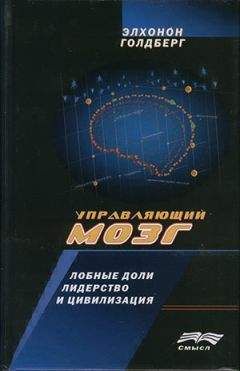22. П. С. Голдман-Ракич (из беседы).
23. Brodmann К. Neue Ergebnisse uber die vergleichende histologische Lokalisation der Grosshirnrinde mit besonderer Berucksichtigung des Stirnhirns // Anat Anz. 1912. Vol. 41. Suppl. P. 157—216. Цит. по: Fuster J. The Prefrontal Cortex: Anatomy, Physiology, and Neuropsychology of the Frontal Lobe. 3rd ed. Philadelphia: Lippincott-Raven, 1997.
24. Barkley R. A. ADHD and the Nature of Self-Control. New York: The Guilford Press, 1997.
25. Rauch S. L. et al. Regional cerebral blood flow measured during symptom provocation in obsessive-compulsive disorder using oxygen 15-labeled carbon dioxide and positron emission tomography // Arch. Gen. Psychiatry. 1994. Vol. 51, № 1. P. 62-70.
26. Luria A. R. Higher Cortical Functions in Man. New York: Basic Books, 1966.
27. Goldberg E., Tucker D. Motor Perseverations and Long-Term Memory for Visual Forms // Journal of Clinical Neuropsychology. 1979. Vol. 1, № 4. P. 273-288.
28. Grant D. A., Berg E. A. A behavioral analysis of degree of reinforcement and ease of shifting to new responses in a Weigl-type card-sorting problem // Journal of Experimental Psychology. 1948. Vol. 38. P. 404-411.
29. См. обзор: Clinical Neuropsychology / Ed. by K. Heilman, E. Valenstein. New York; Oxford: Oxford University Press, 1993.
30. Goldberg E., Barr W. B. Three Possible Mechanisms of Unawareness Deficit // Awareness of Deficit After Brain Injury / Ed. by G.Prigatano, D. Schacter. New York: Oxford University Press, 1991. P. 152-175.
31. Ibidem.
Глава 9. Социальная зрелость, моральность, право и лобные доли
1. Oppenhelm H. Zur Pathologie der Grosshirngeschwulste // Archives of Psychiatry. 1889. Vol. 21. P. 560.
2. Schore A. Affect Regulation and the Origin of the Self: The Neurobiology of Emotional Development. Hillsdale, NJ: Lawrence Erlbaum Assoc, 1999.
3. Anderson S. W. et al. Impairment of social and moral behavior related to early damage in human prefrontal cortex // Nat. Neurosci. 1999. Vol. 2, № 11. P. 1032-1037.
4. Posner M. I., Rothbart M. К. Attention, self-regulation and consciousness // Philos. Trans. R. Soc. Lond. B. Biol. Sci. 1998. Vol. 353, № 1377. P. 1915-1927.
5. Yakovlev P. I., Lecours A. R. The myelogenetic cycles of regional maturation of the brain // Regional Development of the Brain in Early Life / Ed. by A. Minkowski. Oxford: Blackwell, 1967. P. 3-70.
6. Golding W. Lord of the Flies. Reprint edition. Mattituck, NY: Amereon Ltd, 1999.
7. Volavka J. Neurobiology of Violence. Washington: American Psychiatric Press, 1995; Raine A. The Psychopathology of Crime: Criminal Behavior as a Clinical Disorder. San Diego: Academic Press, 1993.
8. Goldberg Е. et al. A reticulo-frontal disconnection syndrome // Cortex. 1989. Vol. 25, № 4. P. 687-695.
9. Raine A., Buchsbaum M., LaCasse L. Brain abnormalities in murderers indicated by positron emission tomography // Biol. Psychiatry. 1997. Vol. 42, № 6. P. 495-508.
10. Raine A et al. Reduced prefrontal gray matter volume and reduced autonomic activity in antisocial personality disorder // Arch. Gen. Psychiatry. 2000. Vol. 57, № 2. P. 119-127; discussion P. 128-129.
11. Luria A. R. Higher Cortical Functions in Man. New York: Basic Books, 1966.
12. Goldberg E. et al. The executive control battery // Psych. Press. Australia, 2000; Goldberg E. et al. Test for bedomning av exekutive dysfunktion // Psykologiforlaget AB. Sweden, 1997.
13. Для описания см.: Lezak M. D. Neuropsychological assessment. 3rd ed. New York: Oxford University Press, 1995.
14. Sacks O. W. The Man Who Mistook His Wife for a Hat: And Other Clinical Tales. New York: Touchstone Books, 1998.
Глава 10. Роковые разъединения
1. Geshwind N. Disconnection syndromes in animals and man // Brain. 1965. Vol. 88. P. 237-294.
2. Goldberg E. et al. A reticulo-frontal disconnection syndrome // Cortex. 1989. Vol. 25, № 4. P. 687-695.
3. Goldberg E. et al. Retrograde amnesia: possible role of mesencephalic reticular activation in long-term memory // Science. 1981. Vol. 213, № 4514. P. 1392-1394.
4. См. обзор: Hanbook of Schizophrenia // Ed. by H. S. Nasrallah. New York; Amsterdam: Elsevier, 1991.
5. Kraepelin E. Dementia Praecox and Paraphrenia. Edinburgh: E. S. Livingstone, 1919/1971.
6. Berman К F., Zee R. F., Weinberger D. R. Physiologic dysfunction of dorsolateral prefrontal cortex in schizophrenia. II. Role of neuroleptic treatment, attention, and mental effort // Arch. Gen. Psychiatry. 1986. Vol. 43, № 2. P. 126-135; Weinberger D. R., Berman К F., Zee R. F., Physiologic dysfunction of dorsolateral prefrontal cortex in schizophrenia. I. Regional cerebral blood flow evidence // Arch. Gen. Psychiatry. 1986. Vol. 43, № 2. P. 114-124.
7. Milner B. Effects of different brain lesions in card sorting: The role of the frontal lobes // Archives of Neurology. 1963. Vol. 9. P. 100-110; Weinberger D. R., Berman К F., Zee R. F. Physiologic dysfunction of dorsolateral prefrontal cortex in schizophrenia. I. Regional cerebral blood flow evidence // Arch. Gen. Psychiatry. 1986. Vol. 43, № 2. P. 114-124.
8. Franzen G., Ingvar D. H. Absence of activation in frontal structures during psychological testing of chronic schizophrenics // J. Neurol. Neurosurg. Psychiatry. 1975. Vol. 38, № 10. P. 1027-1032; Buchsbaum M. S. et al. Anteroposterior gradients in cerebral glucose use in schizophrenia and affective disorders // Arch. Gen. Psychiatry. 1984. Vol. 41, № 12. P. 1159-1166.
9. Weinberger D. R., Berman К. F. Speculation on the meaning of cerebral metabolic hypofrontality in schizophrenia // Schizophr. Bull. 1988. Vol. 14, № 2. P. 157-168.
10. Valenstein E. The Great and Desperate Cures. New York: Basic Books, 1986.
11. Stevens J. R. An anatomy of schizophrenia? // Arch. Gen. Psychiatry. 1973. Vol. 29, № 2. P. 177-189; Matthysse 5. Dopamine and the pharmacology of schizophrenia: the state of the evidence // J. Psychiatr. Res. 1974. Vol. 11. P. 107-113.
12. См. обзор: Cooper J. R., Bloom F. E., Roth R. H. The Biochemical Basis of Neuropharmacology. 7th ed. New York: Oxford University Press, 1996.
13. Carlsson M., Carlsson A. Schizophrenia: a subcortical neurotransmitter imbalance syndrome? // Schizophr. Bull. 1990. Vol. 16, № 3. P. 425-432.
14. См. обзор: Cooper J. R., Bloom F. E., Roth R. H. The Biochemical Basis of Neuropharmacology. 7th ed. New York: Oxford University Press, 1996.
15. Gershon E. S., Rieder R. O. Major disorders of mind and brain // Sci. Am. 1992. Vol. 267, № 3. P. 126-133.
16. Kolb В., Whishaw I. Q. Fundamentals of Human Neuropsychology. 4th ed. New York: W. H. Freeman Company, 1995.
17. Interagency Head Injury Task Force Report: National Institute of Neurological Disorders and Stroke. Bethesda, MD: National Institute of Health, 1989.
18. Masdeu J. С., Abdel-Dayem H., Van R. Heertum L. Head trauma: use of SPECT // J. Neuroimaging. 1995. Vol. 5 Suppl 1. S. 53-57.
19. Goldberg E., Bougakov D. Novel Approaches to the Diagnosis and Treatment of Frontal Lobe Dysfunction // International Handbook of Neuropsychological Rehabilitation // Ed. by A.-L. Christensen, B. P. Uzzel. New York: Kluwer Academic / Plenum Publishers, 2000. P. 93-112.
20. Ibidem.
21. Barkley R. A. ADHD and the Nature of Self-Control. New York: The Guilford Press, 1997.
22. Из Possible Poetry, неопубликованной коллекции стихов, написанной Тоби, когда он был подростком на улицах Сиднея. Печатается с разрешения автора.
23. Tourette G. G. Etude sur une affection nerveuse caracterisee par de l'incoordination motrice accompagnee d'echolalie et de copralalie // Arch. Neur. 1885. Vol. 9.
24. Bazil С. W. Seizures in the life and works of Edgar Allan Рое // Arch. Neurol. 1999. Vol. 56, № 6. P. 740-743; Рое А. Е. The Complete Tales and Poems of Edgar Allan Рое. New York: Barnes & Nobles Books, 1989.
25. Shapiro E. Shapiro A. K., Clarkin J. Clinical psychological testing in Tourette's syndrome // J. Pers. Assess. 1974. Vol. 38, № 5. P. 464-478.
26. Sheppard D. M. et al. Tourette's and comorbid syndromes: obsessive compulsive and attention deficit hyperactivity disorder. A common etiology? // Clin. Psychol. Rev. 1999. Vol. 19, № 5. P. 531-552.
27. Sacks O. W. Tourette's syndrome and creativity // British Medical Journal. 1992. Vol. 305. P. 1515-1516.
28. Handler L. Twitch and Shout: A Touretter's Tale. New York: Plume, 1999.
Глава 11. «Как вы можете мне помочь?»
1. Goldberg E. et al. Selective effects of cholinergic treatment on verbal memory in posttraumatic amnesia // J. Clin. Neuropsychol. 1982. Vol. 4, № 3. P. 219-234.
2. Polyakov V. М., Moskovichyute L. I., Simernitskaya Е. G. Neuropsychological Analysis of the Role in Brain Functional Organization in Man // Modern Problems in Neurobiology. Tbilisi, 1986. P. 329-330; Krotkova O. A., Karaseva T. A., Moskovichiute L. I. Lateralization features of the dynamics of higher mental functions following endonasal glutamic acid electrophoresis // Zh. Vopr. Neirokhir. im. N. N. Burdenko. 1982. № 3. P. 48-52; Korsakova N. K., Moskovichyute L. I. Subcortical Structures and Psychological Processes. Moscow: Moscow University Press, 1985; Moskovichyute L. I., Mimura M., Albert M. Selective Effect of Dopamine on Apraxia. Paper presented at the AAN Annual Meeting, Washington, D.C., 1994.
3. Dobkin B. H., Hanlon R. Dopamine agonist treatment of antegrade amnesia from a mediobasal forebrain injury // Ann. Neurol. 1993. Vol. 33, № 3. P. 313-316.
4. Hobson D. E. Pourcher E., Martin W. R. Ropinirole and pramipexole, the new agonists // Can. J. Neurol. Sci. 1999. Vol. 26 Suppl 2. S. 27-33.
5. Ross E. D., Stewart R. M. Akinetic mutism from hypothalamic damage: Successful treatment with dopamine agonists // Neurology. 1981. Vol. 31. P. 1435-1439; Dobkin B. H., Hanlon R. Dopamine agonist treatment of antegrade amnesia from a mediobasal forebrain injury // Ann. Neurol. 1993. Vol. 33, № 3. P. 313-316.
6. Kraus M. F., Maki P. The combined use of amantadine and l-dopa/carbidopa in the treatment of chronic brain injury // Brain Inj. 1997. Vol. 11, № 6. P. 455-460; Kraus M. F., Maki P. M. Effect of amantadine hydrochloride on symptoms of frontal lobe dysfunction in brain injury: case studies and review // J. Neuropsychiatry Clin. Neurosci. 1997. Vol. 9, № 2. P. 222-230.
7. Golden D. Building a Better Brain // Life. 1994. July. P. 62-70.
8. Damasio A. Descartes' Error, Emotion, Reason, and the Human Brain. New York: Putnam Publishing Group, 1994; Damasio A. The Feeling of What Happens: Body and Emotion in the Making of Consciousness. New York: Harcourt Brace, 1999.
9. Rowe J. W., Kahn R. L. Successful Aging. New York: Pantheon, 1998.
10. Katzman R. The prevalence and malignancy of Alzheimer's disease: a major killer // Arch. Neurol. 1976. Vol. 33. P. 217.
11. Newell A., Simon H. A. Human problem solving. Englewood Cliffs, NJ: Prentice-Hall, 1972; Simon H. A. et al. Scientific discovery: Exploration of the creative process. Cambridge, MA: MIT Press, 1987.
12. Hamm R. J. et al. Exposure to environmental complexity promotes recovery of cognitive function after traumatic brain injury // J. Neurotrauma. 1996. Vol. 13, № 1. P. 41-47.
13. Kolb B. Brain Plasticity and Behavior. Mahwah, NJ: Erlbaum, 1995.
14. Heiss W. D. et al. Long-term effects of phosphatidylserine, pyritinol, and cognitive training in Alzheimer's disease. A neuropsychological, EEG, and PET investigation // Dementia. 1994. Vol. 5, № 2. P. 88-98.
15. Gould E. et al. Proliferation of granule cell precursors in the dentate gyrus of adult monkeys is diminished by stress // Proc. Natl. Acad. Sci. USA. 1998. Vol. 95, № 6. P. 3168-3171.
16. Gould E. et al. Neurogenesis in the neocortex of adult primates // Science. 1999. Vol. 286, № 5439. P. 548-552.
17. Kempermann G., Kuhn H. G., Gage F. H. More hippocampal neurons in adult mice living in an enriched environment // Nature. 1997. Vol. 386, № 6624. P. 493-495.
18. Ibidem.
19. Ibidem.
20. Albert M. S. et al. Predictors of cognitive change in older persons: MacArthur studies of successful aging // Psychol Aging. 1995. Vol. 10, № 4. P. 578-589.
21. Snowdon D. A. et al. Linguistic ability in early life and cognitive function and Alzheimer's disease in late life. Findings from the Nun Study [see comments], Jama. 1996. Vol. 275, № 7. P. 528-532.
22. Ibidem.
23. Dellu F. et al. Facilitation of cognitive performance in aged rats by past experience depends on the type of information processing involved: a combined cross-sectional and longitudinal study // Neurobiol. Learn. Mem. 1997. Vol. 67, № 2. P. 121-128.




